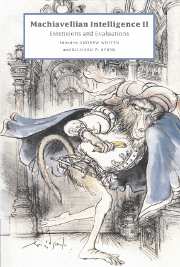Book contents
- Frontmatter
- Contents
- Contributors
- Preface
- 1 Machiavellian intelligence
- 2 Friendships, alliances, reciprocity and repair
- 3 Why Machiavellian intelligence may not be Machiavellian
- 4 Social intelligence and success: Don't be too clever in order to be smart
- 5 Minding the behaviour of deception
- 6 The Machiavellian mindreader
- 7 Exploiting the expertise of others
- 8 Primates' knowledge of their natural habitat: As indicated in foraging
- 9 Evolution of the social brain
- 10 The modulatory of social intelligence
- 11 The Technical Intelligence hypothesis: An additional evolutionary stimulus to intelligence?
- 12 Protean primates: The evolution of adaptive unpredictability in competition and courtship
- 13 Egalitarian behaviour and the evolution of political intelligence
- 14 Social intelligence and language: Another Rubicon
- Index
6 - The Machiavellian mindreader
Published online by Cambridge University Press: 23 November 2009
- Frontmatter
- Contents
- Contributors
- Preface
- 1 Machiavellian intelligence
- 2 Friendships, alliances, reciprocity and repair
- 3 Why Machiavellian intelligence may not be Machiavellian
- 4 Social intelligence and success: Don't be too clever in order to be smart
- 5 Minding the behaviour of deception
- 6 The Machiavellian mindreader
- 7 Exploiting the expertise of others
- 8 Primates' knowledge of their natural habitat: As indicated in foraging
- 9 Evolution of the social brain
- 10 The modulatory of social intelligence
- 11 The Technical Intelligence hypothesis: An additional evolutionary stimulus to intelligence?
- 12 Protean primates: The evolution of adaptive unpredictability in competition and courtship
- 13 Egalitarian behaviour and the evolution of political intelligence
- 14 Social intelligence and language: Another Rubicon
- Index
Summary
Introduction
In 1988, one section of Machiavellian Intelligence asked ‘are primates mind-readers?’. There seemed an obvious logic for posing the question. One of the most powerful ways to succeed in a complex social world is to read the very minds of one's companions, and get one step ahead in whatever competitive or co-operative games are at stake. We know this most clearly from our own human Machiavellianism, but we also know that the complexities of primate social life suggest niches for the ability and we know that primates have advanced social cognition: thus, the distribution of mindreading mechanisms in the primate order clearly begs investigation. Unfortunately, despite the years that had elapsed since Premack & Woodruff (1978) first tried experimentally to answer the question, ‘Does the chimpanzee have a theory of mind?’ (see Chapter 1), relevant empirical studies were still few in 1988 and mostly restricted to our own species: those on non-human primates could be counted on the fingers of one hand.
The situation has changed dramatically since 1988. Growth in the study of mindreading has blossomed, perhaps more than any other subject dealt with in the predecessor to this volume. To be sure, this has principally focused on the development of the capacity in humans. Developmental psychologists were the first to pick up on the potential of Premack & Woodruff's ideas, and more specifically on suggestions in the peer commentary on the article, that testing whether an individual can discriminate another's false belief would be the most convincing way to demonstrate a true reading of ‘mind’.
- Type
- Chapter
- Information
- Machiavellian Intelligence IIExtensions and Evaluations, pp. 144 - 173Publisher: Cambridge University PressPrint publication year: 1997
- 21
- Cited by



